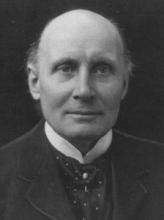Alfred North Whitehead was born 15 February 1861 in Ramsgate, Isle of Thanet, England, the youngest of four children to the Reverend Alfred Whitehead and his wife, Maria Sarah. On 16 December 1890 he married Evelyn Ada Maud Rice (1865-1950), with whom he had a daughter Jessie and two sons, North and Eric. Whitehead died on 30 December 1947 in Cambridge, Massachusetts, recognized as one of the twentieth century’s foremost mathematicians, philosophers and metaphysicians.
Whitehead’s intellectual journey began with questions of mathematics and symbolic logic, and concluded with epistemology and metaphysics. In 1880 he enrolled in Trinity College, Cambridge, with a mathematics scholarship and four years later was awarded a fellowship there, inaugurating a career often divided into three phases. The first, from 1884 to 1910, was consumed primarily with matters of mathematics and logic. Bertrand Russell, his star pupil during this period, became a close friend and intellectual companion with whom he later published the colossal three-volume Principia Mathematica (1910-1913).
In 1910 Whitehead entered the second phase of his career, when he left Cambridge for London, holding two successive academic posts at the University College, London (1911-1914), and then as lecturer in applied mathematics at the Imperial College of Science and Technology (1914-1924). During this period he developed philosophies of education (The Aims of Education, 1928) and science (An Enquiry Concerning the Principles of Natural Knowledge, The Concept of Nature, and The Relativity of Nature, 1919-1922).
Despite having never formally studied philosophy, in 1924 Whitehead accepted what would be his final academic post as professor of philosophy at Harvard University, freeing him to explore the questions of metaphysics and epistemology that would culminate in the process philosophy for which he is best known. His complex cosmology, which involves eight categories of existence, twenty-seven categories of explanation and nine ‘categoreal’ obligations, was the subject of his Gifford Lectures at the University of Edinburgh in 1927, presented and later published under the title Process and Reality. That book is considered his seminal work and articulates a ‘philosophy of organism’ in which reality is described in terms of process—further articulated in the creative, interactive relationship of varying degrees of consciousness between Whitehead’s self-coined notions of ‘actual entities’, ‘prehensions’ and ‘nexus’ (plural for nexus). Creativity is the ‘universal of universals’ that accounts for the ‘concrescence’—another of his terms—of ‘actual entities’ which are to be understood neither in terms of Cartesian corporeal substance, Aristotle’s ‘Absolute’, nor that kind of novelty which is understood as displacing or discontinuous with the past. Put more simply, the permanence of reality is not a matter of duration but of being and becoming.
Theologians have been some of the most vigorous developers of Whitehead’s thought, despite the fact that he was not doctrinally sectarian, preferring to discuss the nature of God in relation to metaphysical principles. See for example, the theological reflections of Charles Hartshorne and John B. Cobb’s process theology. For his philosophical contributions Whitehead was honoured with the James Scott Prize of the Royal Society of Edinburgh (1922), the Sylvester Medal, Royal Society (1925), the Butler Medal, Columbia University (1930), the combined honour of Fellowship in the British Academy and the Fellowship of the Royal Society (1931), and in 1945, appointment to the Order of Merit (1945).



